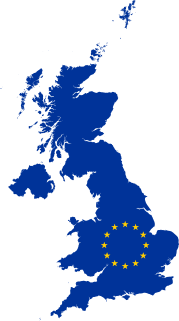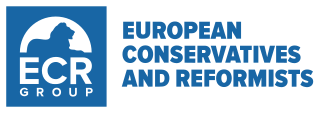The European Democrats were a loose association of conservative political parties in Europe. It was a political group in the European Parliament from 1979 until 1992, when it became a subgroup of the European People's Party–European Democrats (EPP-ED) group. The European Democrats continued to exist as a political group in the Parliamentary Assembly of the Council of Europe (PACE) until 2014, when it became the European Conservatives Group.

Euroscepticism, also known as EU-scepticism, means criticism of the European Union (EU) and European integration. It ranges from those who oppose some EU institutions and policies and seek reform, to those who oppose EU membership outright and see the EU as unreformable. The opposite of Euroscepticism is known as pro-Europeanism, or European Unionism.
The Conservative Party, officially the Conservative and Unionist Party, and also known colloquially as the Tories, Tory Party, or simply the Conservatives, is a political party in the United Kingdom. Ideologically, the Conservatives sit on the centre-right of the political spectrum. The Conservatives have been in government since 2010; as of 2019, they hold an overall majority in the House of Commons, with 364 Members of Parliament. The party also has 258 unelected members of the House of Lords, 9 members of the London Assembly, 31 members of the Scottish Parliament, 16 members of the Senedd and 7,445 local authority councillors.

The Pro-Euro Conservative Party was a British political party announced by John Stevens and Brendan Donnelly in February 1999, formed to contest the 1999 European Parliament election. The founders were Members of the European Parliament who had resigned from the UK Conservative Party in protest at its anti-euro stance. Their reported aim was to replace Eurosceptic William Hague as Conservative leader with Europhile Kenneth Clarke. Stevens later said that they had intended to push Ken Clarke, Michael Heseltine, Chris Patten and other pro-Europeans in the Conservative Party into "an SDP-style breakaway, in combination with the Liberal Democrats". The Pro-Euro Conservative Party disbanded in 2001.

The Civic Democratic Party is a liberal-conservative and eurosceptic political party in the Czech Republic. It holds 25 seats in the Chamber of Deputies, and is the second strongest party following the 2017 election.

Pro-Europeanism, sometimes called European Unionism, is a political position that favours European integration and membership of the European Union (EU).

Roger Helmer is a British politician and businessman. He was a Member of the European Parliament (MEP) for the East Midlands region from 1999 to 2017. Before becoming an MEP, he was a business executive.

Daniel John Hannan, Baron Hannan of Kingsclere is a British writer, journalist and former politician serving as an adviser to the Board of Trade since 2020. He is the founding president of the Initiative for Free Trade. A member of the Conservative Party, he was a Member of the European Parliament (MEP) for South East England from 1999 to 2020.

A European political party, known formally as a political party at European level and informally as a Europarty, is a type of political party organisation operating transnationally in Europe and within the institutions of the European Union. They are regulated and funded by the European Union and are usually made up of national parties, not individuals. Europarties have the exclusive right to campaign during the European elections and express themselves within the European Parliament by their affiliated political groups and their MEPs. Europarties influence the decision-making process of the European Council through coordination meetings with their affiliated heads of state and government. They also work closely and co-ordinate with their affiliated members of the European Commission.

Euroscepticism in the United Kingdom is a continuum of belief ranging from the opposition to certain political policies of the European Union to the complete opposition to the United Kingdom’s membership of the European Union. It has been a significant element in the politics of the United Kingdom (UK). A Eurobarometer survey of EU citizens in 2009 showed that support for membership of the EU was lowest in the United Kingdom, alongside Latvia and Hungary.

Europeans United for Democracy – Alliance for a Europe of Democracies, formerly known as EUDemocrats, was a Eurosceptic and self-described Eurorealist alliance of parties and movements from 15 European countries. It operated as a transnational party at the European level, according to Regulation (EC) No 2004/2003. It incorporated members from both the left and right of the political spectrum.

The Movement for European Reform, abbreviated to MER, was a pan-European alliance of national centre-right political parties with conservative, pro-free market and Eurosceptic inclinations. It consisted of the Conservative Party of the United Kingdom and the Civic Democratic Party of the Czech Republic.

The European Parliament election was the United Kingdom's component of the 2009 European Parliament election, the voting for which was held on Thursday 4 June 2009. The election was held concurrently with the 2009 local elections in England. In total, 72 Members of the European Parliament were elected from the United Kingdom using proportional representation.

The European Conservatives and Reformists (ECR) is a Eurosceptic, anti-federalist political group of the European Parliament. The ECR is the parliamentary group of the European Conservatives and Reformists Party European political party (formerly known as the Alliance of Conservatives and Reformists in Europe or Alliance of European Conservatives and Reformists, but also includes MEPs from four other European parties and thirteen MEPs without European party affiliation.

Edward Hugh Christian McMillan-Scott is a British politician. He was a pro-European Member of the European Parliament (MEP) for Yorkshire and the Humber constituency from 1984 until 2014. He was Leader of then 36 Conservative MEPs 1997–2001 and was elected four times as European Parliament Vice-President between 2004 and 2014. His main portfolio was Human Rights and Democracy.

The European Conservatives and Reformists Party, formerly known as Alliance of European Conservatives and Reformists (AECR) (2009–2016) and Alliance of Conservatives and Reformists in Europe (ACRE) (2016–2019), is a conservative Eurosceptic European political party with a main focus on reforming the European Union (EU) on the basis of Eurorealism, as opposed to total rejection of the EU (anti-EU-ism). It currently has twenty-four member parties and three further independent members from twenty-one countries, in addition to seven regional partners worldwide.

The United Kingdom's component of the 2014 European Parliament election was held on Thursday 22 May 2014, coinciding with the 2014 local elections in England and Northern Ireland. In total, 73 Members of the European Parliament were elected from the United Kingdom using proportional representation. England, Scotland and Wales use a closed-list party list system of PR, while Northern Ireland used the single transferable vote (STV).

Europe of Freedom and Direct Democracy was a Eurosceptic and populist political group in the European Parliament. The EFDD group was a continuation for the Eighth European Parliament of the Europe of Freedom and Democracy (EFD) group that existed during the Seventh European Parliament, with significant changes to group membership.

The Liberal Conservative Reformers is a centre-right political party in Germany which was known from July 2015 to November 2016 as ALFA.

Election of the President of European Conservatives and Reformists was held on 8 March 2011. Election was held after the previous president Michal Kaminski quit the group. Candidates included Czech MEP Jan Zahradil, Brititsh MEP Timothy Kirkhope and Polish MEP Ryszard Legutko. Kirkhope was considered the favourite to become the new President as the Conservative Party dominated the group. He was defeated by Zahradil who became the new President.














